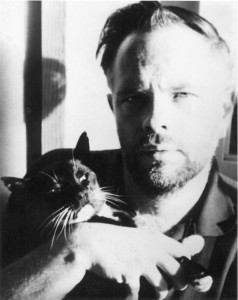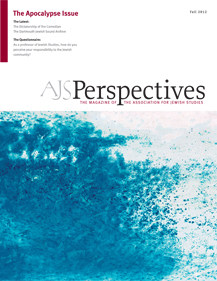
Scholem’s 1919 essay “On Jonah and the Concept of Justice” is his earliest exploration of the theme of apocalypse deferred. In it, Scholem interprets the Book of Jonah as a lesson about how prophecy announces and enacts the deferral of divine judgment. The story told in the Book of Jonah describes a man fleeing his prophetic calling. Jonah is told to inform the citizens of Nineveh about God’s impending punishment for their inequities. Jonah knows that the prophetic calling, if it is successful, must overturn the prediction it declares. He runs from a task that seems self-defeating. He would rather not have to bear the responsibility of a self-canceling utterance. He prefers the disengaged role of what Scholem calls a “historiographer,” someone who announces an impending doom as a straightforward, inevitable fact. But the Book of Jonah is a lesson in prophecy’s difference from historiography, according to Scholem. Prophecy utters the verdict in which a divine judgment is announced but the judgment is not executed: “Judgment is allowed, but the execution of it remains something entirely different.” Prophetic justice is not judgment but the deferral of judgment. Scholem claims that the nature of prophetic utterance as it represented in the Book of Jonah defines the nature of all of the (written) Torah’s commandments: they cannot be executed as they stand (“the written Torah cannot be applied”). The non-executability of the written Torah calls into being a tradition of endless oral interpretation. Justice thus exists in the necessary delay between canon as judgment and tradition as interpretation. And that delay is nothing other than “messianic time as eternal present” (p. 359). The Jewish people live within the messianic time of deferred judgment by virtue of the endless tradition—continuing revelation—of the Torah. The Jewish people keep up the “steady stream of transformations” in which they do not enact the Torah’s judgments. The written Torah, because it cannot know in advance the circumstances that each case involves, could only be applied in a mechanical way, deaf to any appeal. Interpretation is not so much about applying the law but delaying its execution with appeal after appeal.
The Torah, Scholem explains, enjoins the death penalty for homicide, but Talmudic interpretation with its demand for two concurring eyewitnesses makes a guilty verdict practically impossible. The prophet’s speech, like the Talmud’s interpretation of the written Torah’s homicide law, also operates in the gap between judgment and execution, but the stakes are much greater. “The prophets demand justice, in order infinitely to eliminate the Last Judgment” (p. 357). The Last Judgment is deferred when the prophet, or indeed any righteous individual (zaddik), stands before the divine court to ask one more question. “Where the court pronounces a verdict, justice raises a question” (p. 357). The Book of Jonah, read on the afternoon of the Day of Atonement, teaches the Jewish people not to wait passively for the Messiah but to live in the messianic present in which “no Last Judgment follows.” The key is to put the Last Judgment in the past. Deferral is accomplished through a form of temporal overleaping, or short-circuiting, of the apocalypse.
I like to think that Scholem would have been a great fan of Philip K. Dick’s science fiction— not only because Scholem appreciated good science fiction. Scholem actually gave Walter Benjamin a science fiction book as a wedding present, Paul Scheerbart’s Lesabendio. (One wonders what Dora made of this gift.) It’s rather that Dick, at least in his last novels, seems almost to be channeling Scholem. Scholem describes the messianic present of the non-execution of God’s judgment as “perpendicular to his command, just as forces relate in physics” (p. 355). The “orthogonal” relation of our clock-time to messianic time is perhaps the central theme of Dick’s Exegesis, a collection of more than eight thousand notebook sheets written from 1974 to 1982 containing his theological and philosophical reflections about the meaning of certain “road to Damascus” experiences that befell him in February and March of 1974. (The Exegesis was first published last year.) The Exegesis and the late novels that were written in parallel with it are an extended exploration of the basic themes that inform Scholem’s scholarship, from Gnosis and its Jewish background to the Torah as continuing revelation. Dick seems to be led to conclusions similar to those that inform Scholem’s early essay “On Jonah and the Concept of Justice.” In a June 1981 entry in The Exegesis, Dick writes: “In their [the Jews’] concept of Torah (apparently living info) they have one of the most valuable concepts known to man . . . If the Jews froze this information, they would stifle the process-life in it—like endlessly playing one tape cassette on your audio system forever” (p. 752). The living Torah for Dick—what Scholem calls “the unending deferral of tradition”—is the information that overrides mechanical causation and the clock-time linearity that ultimately leads to entropic disintegration and nothingness. Dick describes the unwinding, mechanical clock of “normal” temporality as the working of a “retribution machine” (p. 567): “Sentence by the court is automatic, not interpretive. . . . The court knows only the info fed to it; it is a machine” (p. 561). The living Torah (Dick will give it many names besides Torah, including Christ and Shekhinah) enters time to override and reverse the judgment. “It is impossible that the wellspring of prophetic inspiration ‘could have dried up in the first century C.E.’ Closing the canon is a human—not divine—idea” (Exegesis, p. 752). Like Scholem, Dick believes that to close the canon is to break the link between our world and revelation, and to do this is to cast the world into nothingness: “No you and no world. Cosmic death.”
In one of his last novels, Divine Invasion (1981), Dick gives narrative shape to the drama of the living Torah holding the apocalypse at bay. The novel presents us with the biblical God, “Yah,” who is suffering in exile on a barren planet, driven from the earth by the two empires who have divided the earth between themselves, one serving the principle of atheistic science, the other serving tyrannical faith. Returning to earth in the womb of a woman who dies in a terrible accident upon the reentry of her spacecraft into earth’s atmosphere, Yah (named Emmanuel now) grows up with brain damage. As he slowly recovers his sense of his identity, assisted by a mysterious young girl who educates him, the child Emmanuel decides that the suffering he has endured at the hands of the powers in control of the earth must be answered with the destruction of the earth. There is no other remedy for a world under the unjust rule of what Dick calls “the Empire.” The effort to stay this decision of annihilation takes up the last section of the novel. Emmanuel is won over by the young girl through a wager in which she leads him into another world of her creation, a world of beauty. After Emmanuel falls in love with this world and with the young girl, she reveals herself to him as his own creation. She is the Torah, also known as the tenth sefirah, Shechinah. But here the story does not end, for in an act of mercy upon the animals caged in zoo, they unwittingly release the goat-shaped Belial, the Evil One, into the world once more. The drama begins again, but the possibility of experiencing the world as beauty remains to assist humanity in the unending effort to overcome the nihilism of Belial for whom creation is only ugly. The final sentence of the novel reads: “Gathering together the broken fragments of what had once been light.” It is not an ending, but an endless battle that Dick says “is waged for each soul individually.” He explains: “This is what the rabbis teach. They have no doctrine of fallen man as a whole. Salvation is on a one by one basis” (p. 232).
Dick’s novel, despite how it may sound from this synopsis, is far from being a strained theological allegory. Dick uses a Jewish nebbish named Herb Asher as the focus of the narrative. In the opening of the novel, we find Asher living in voluntary exile on the planet to which Yah has been exiled. Yah interrupts the audio tapes that Asher listens to with “faint but obviously sentient driblets of information” (p. 22). Herb Asher is commanded by Yah to return to earth along with the young woman, living in a nearby shelter, who will carry Yah in her womb. Herb Asher, seriously injured in the reentry accident, is placed in cryonic suspension. His mind replays, just as if it were happening for the first time, his recent past on the distant planet. A radio transmitter near the hospital where Asher lies in cryonic suspension broadcasts round-the-clock Broadway musicals, and Asher is both puzzled and annoyed by recurring snippets from Fiddler on the Roof that seem to break into the audio tapes he listens to in his outpost. Now, in Asher’s relived memories of his exile, melodies from Fiddler on the Roof compete with the “faint driblets” from Yah, the exiled God, for Asher’s attention. This is an allegory for the modern Jewish condition that Scholem, I am pretty sure, would have appreciated.

